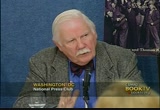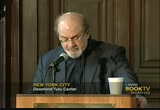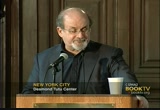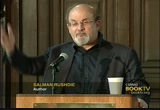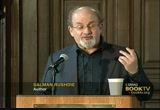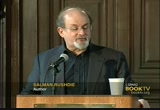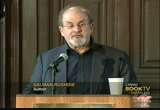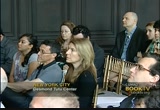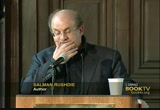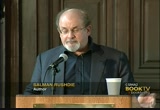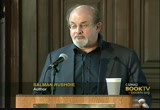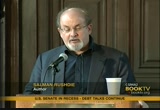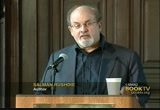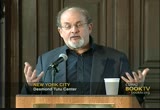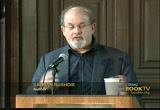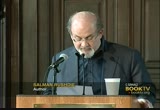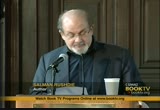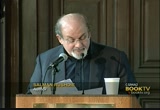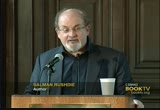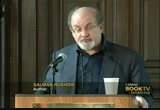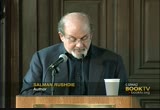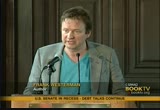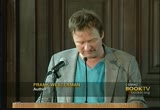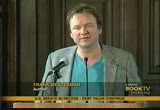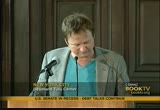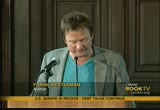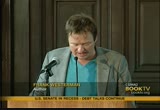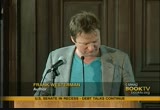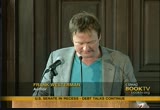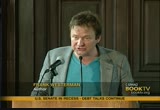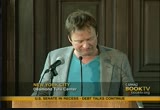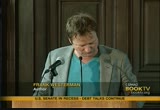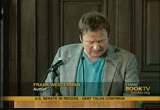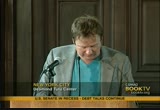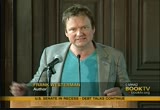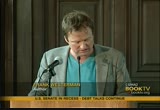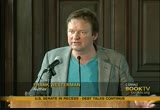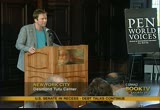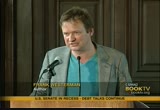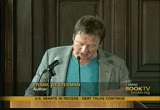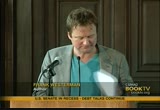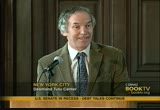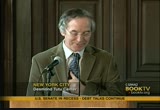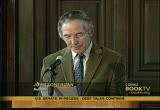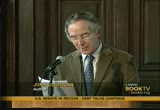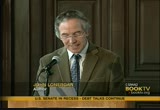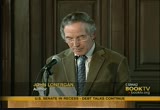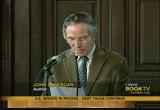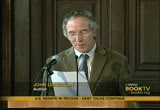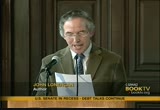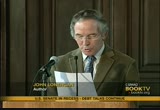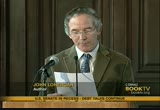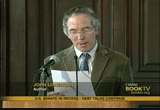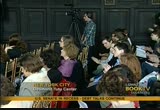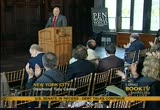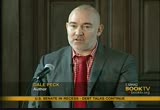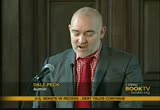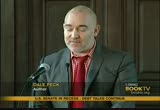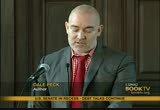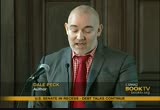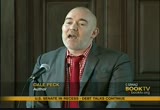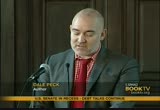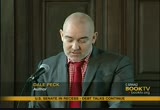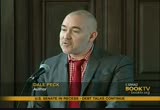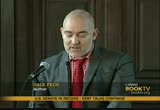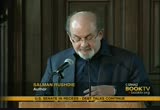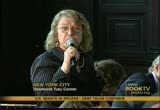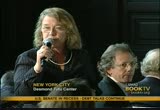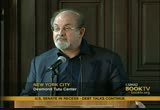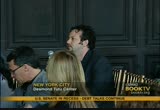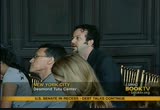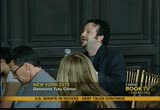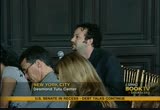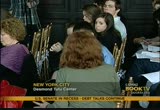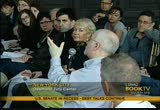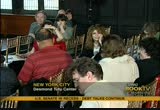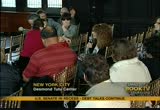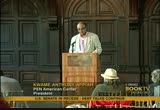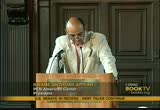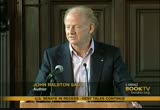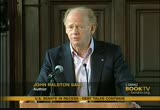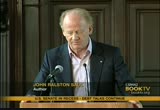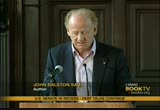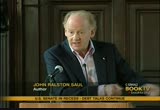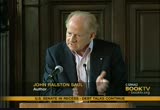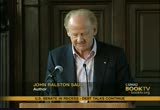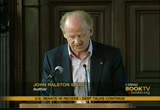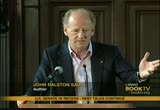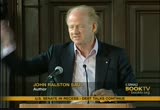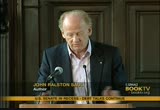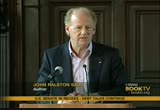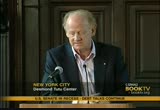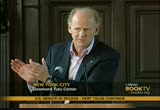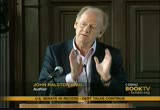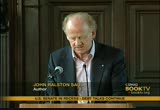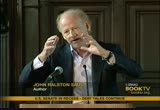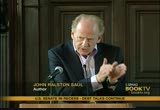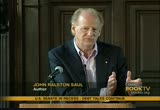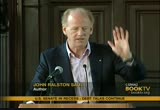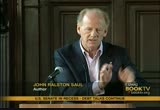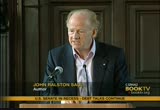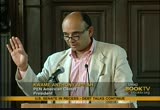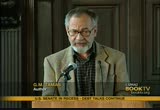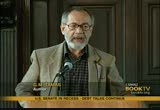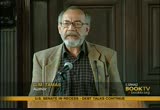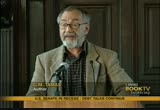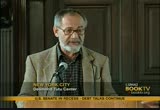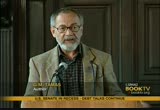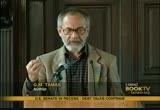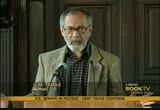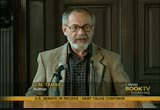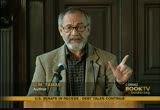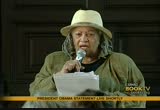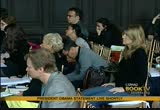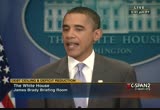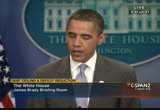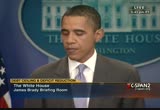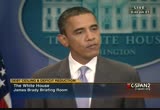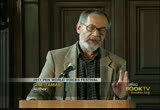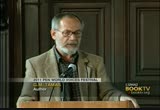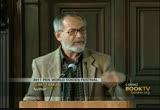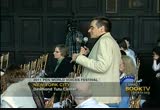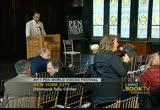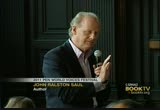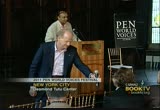tv Book TV CSPAN July 31, 2011 6:00pm-9:00pm EDT
6:00 pm
not there any more, but. >> yes, sir? >> yes, my name is martin, i'm with the strategies here in the national press building. the only time i remember hearing the word "army" used in terms of a march on washington was coxie's army, and i'm wondering how this fits into that. was there parallels drawn to that at the time? >> one of the reasons that coxies was a movement for better road. and one of the reasons that the coxie army failed was they couldn't get here. and the difference the bonus army came, there were good roads. they were, they literally thought, coxie literally believed that the formers were being kept in little corners in subsist tense and if we built roads, in the middle of the depression, we would build a much stronger country. and we put the poor people to work building the roads, it was y of doing ends up as a recruiter and a
6:01 pm
participant in the bonus army. >> would you say a few words about the impact, influence, real and perceived of communists on the bonus army? >> oh, ok. what happened was this, this continued into the 1950's. that there were communists that the bonus army communists led. the chief of police said that the most he ever saw at any one time was a group of about 110. on the other hand, there were about 45,000 veterans who came and went in washington during that summer. those are the numbers. if you look at the 110, you find four or five card-carrying communists, known to be card-carrying communiststh and then you've had some other people who kept going to meetings, that were sponsored by the communist party. which was a legitimate political party. at the time. in fact, they ran, a guy for president who came to the camps
6:02 pm
and got nowhere, because he had set out world war one as a conscientious objecter. he didn't go down well with the veterans. officially, anything written down by anybody who was running the bonus army, such as wealther waters, it stated specifically, that there were to be no communists in any of the camps he operated. so you're dealing with about 150 men who were iolad in 150 men who were isolated into one camp among the 21 camps in washington. one very quick question. and there will be just about where we have got to be. >> i see two things here that interest me. i wonder if the 1932 coinciding really with the expansion of radios, has anything to do. you know, they could get their message out. >> absolutely. lowell thomas was covering it,
6:03 pm
it was big-time radio. yes, ma'am. >> and as far as the blacks, i saw one -- show on the history channel, which was about the final days of the war. they said there were a special groups, armies of blacks. didn't tell about the french, but just about the u.s. ones, that were supposedly poorly trained, poorly equiped and more or less made fools of themselvesth and that was reported that, oh, blacks can't fight. in the very end of the war. so that's another use or application of blacks there. >> yes, ma'am, thank you very much. we appreciate it. [applause]
6:04 pm
6:05 pm
participants include toni morrison, salman rushdie and dale peck. this is part of the 2011 world voice festival held annually in new york city. it's just under three hours. >> okay. one of the things having this working day i am sure other people will join as the day goes on. one of the reasons for having it was to deflect 25, 26 years later after the mid 80's on some of the themes that were discussed and what has happened since. people forget the sort of legendary 1986 congress that it wasn't open to the general public but there was a closed congress in which all the sessions were only for ten members and i guess members of
6:06 pm
the press. the new version of the festival is i think more rightly opened up to the public and that has been a great pain but it's good we have this day to talk among ourselves. i want to just say a few things about that because to set the tone as it were. one of the things i remember about it because i was there as a much younger writer listening to all of these grand figures it was quite a gathering of voices of anybody you can think of, john updike, susan, on and on and done, and me, the kid in the corner. one of things i remember frompb the festival you are having now is how bad tempered it was. they were fighting with each
6:07 pm
other like cats and dogs. there was a panel in which politicians have been invited other figures like that, and decided that he was an anti-semite and this was in spite of the fact that he was a jew and had in fact austria under his leadership had accepted more refugees for the soviet union the had one brief meeting with yasser arafat to and so she was collecting signatures against them and so on and stood up from the floor of the congress to denounce him in his session and he responded with the enormous he said look there's a lot of people in this room it's too big of a session
6:08 pm
to discuss these important matters and what i suggest is on central park. he said what i suggest is after the session in this we find a room in the hotel and with no time limits to discuss whatever you want to discuss. nobody wanted to do that. so, that shut her up. there was a big quarrel between grace paley representing the views of a number of female delegates that they were seriously underrepresented on the panel which was true, and she got into a quarrel with norman mailer about that, which led to his notorious remark that he hadn't set up this congress to be whipped by grace paley. what led to her being on the front page of the post.
6:09 pm
that is quite an achievement. she could not have expected what happened in her life. it also led to border dissenting from the feminist objection. suzanne made her remark to say it was not an equal opportunity employer which didn't go down at or well. but susan kind of didn't care. so there was a big fight. saul bellow had made one of my favorite memories and the festival were the opening ceremony was the public library, and because norman mailer had in many people's views invited secretary of state george shultz to deliver the opening address, not long after he made a statement supporting the apartheid regime in africa which meant the south african writers boycotted the event. because he was there there was a
6:10 pm
in almost presidential level of security around the public library, and we all had to bring various forms of id and he forgot to bring his ied. and this was actually quite soon after he won the nobel prize so there was an extraordinary fight and i saw him on the chair like this outside the entrance not being allowed in on till norman mailer camera panned vouched for him. you can just imagine how much he had enjoyed being vouched for. the nobel laureate was. so it was a very contentious time, but one of the reasons it was contentious is all of us believed the public role of the writer was important and needed to be argued out and was not
6:11 pm
kidding around so people to get very seriously and there was still the cents and 863 years before the fall of the soviet union, two years before czechoslovakia led the way to words the communist downfall the time when writers are around the world were in many ways at the center of the national argument in a way we may feel is no longer the case and what i talk about is why that is and what should be done about it.óu there are clearly parts of the world is still a case and we recognized in earlier sessions of this festival the problems that have been rising in china. our colleague hasn't been able to the year and sends personally
6:12 pm
had translated and we've now replied to that and there is a question going out today about that. so you should have a look at that. he was very appreciative of the gestures made at this ceremony and the chair and so on, and he very much felt he was here in spirit even though he couldn't be here, so we sent back messages saying we would certainly keep up the attention from this case. so there are obviously parts of the world where writers, film makers, artists have been still very much at the forefront of that national argument, and i don't don't know quite why it doesn't happen so much in america anymore. there was a time when congress there were the writers like norman mailer and gideon and
6:13 pm
robert stone and writers who consciously looked for a public voice, and i'm not sure who the equivalence would be today. that might be the thing to talk about. what's gone wrong when we started the festival if you liked the public faith. sorry, this is nice -- my spinach, you can hear the popeye music. we felt at that time seven years ago that there was a place for writers, a rule in restarting a public conversation between the united states and the rest of the world which at that moment
6:14 pm
the bush administration seemed to have been quite seriously the railed. america wasn't listening to the world of voices and the world of voices were increasingly hostile to what america was saying and doing at that time, and we particularly good for america or for the rest of the world either but you needed to start rebuilding the bridge in which these conversations even if they were tough conversations could take place. i remember in the first year we invited a number of writers so those voices at the moment could be heard in the city and they were the sessions you couldn't get into. people were hanging off the rafters to hear those voices so it was clear that among the american audience and the leadership there was an enormous hunger to hear those voices and not just a few like the official voices and bullet points you hear on the news.
6:15 pm
clearly times have changed and that idea of a dialogue between the most interesting writers and intellectuals in the world and american readers and writers it's still important to keep up and i am delighted after seven years this festival seems to have established itself in the city life and people see that it's valuable. on the question of america's relationship in the world, where it's at right now, it's a little strange and administration came in on a peace platform has actually sent more american soldiers and has spent more money overseas than the administration before it.
6:16 pm
you can be an admirer of the obama's but it's a strange fact that that's happened given that a speech he made that he was going to bring the troops home and he said you can take that to the bank and put it in the bank and it hasn't happened yet. so, where are we in terms of that conversation between america and the world. that might be something to pick up on here. that question is of the imagination, that was the subject the imagination of the writer and the state. how does the imaginings. confront and redefine and argue if the society given to us by our leaders who are in a way imagining the world? i remember one of the things
6:17 pm
people are due out at the 1986 conference was whether you could say the state had such a thing as an imagination. i've always remembered the great as we used to say yugoslav writer in his statement said he felt not only did the state have in imagination but said to have a sense of humor and she said i'd like to give you an example of a joke by the state and he talked about a letter that he had received living in paris at the time a letter from back home, an ordinary looking letter and on the first page there was an official stamp that said this letter has not been censored. [laughter] and so that question of how --
6:18 pm
was behind the formulation was the site and very important idea that the reason why those writers, artists and politicians often find themselves at odds is in many ways they are trying to do the same thing to create a version of the world and impose it on reality, and any political figure or states and has a kind of vision or claims to have a vision about how things are and should be and where they should go off and how to get their and the attempt to persuade us of that accuracy and justice that we should prefer it to another division being offered by another site. making visions of the world as routinely what writers and artists do so quite often particularly at contentious
6:19 pm
times those visions come into collision and that is what norman was trying to get at all those years ago what is to be done about it and if we believe there are things wrong with it if you like the official versions of the world we are being spoon fed by political leaders would do we do about combating and offered our own versions in that place and get people to listen. we have a group of people who are going to speak one after the other and then there will be a break and more people. let me just tell you they're running order and then i will get off the stage. the first speaker is frank, who is one of the leading nonfiction writers in europe at the time of
6:20 pm
the yugoslav war from the netherlands i invited him to be the correspondent in belgrade and he's also worked in moscow as a correspondent. among his most frequently translated titles are engineers of the soul which was recently listed as the best travel book of 2010 by the sunday times in london to read in september, 2010 he published the first translated into a number of land which, english, german, italian and spanish. he's from amsterdam. then we have a statement by charles orman. charles norman is not able to be with us because he is in jail, and he says in the message he survived over 30 years in the florida prison for the long full at.
6:21 pm
his poetry, short stories, memoirs and plays and numerous national writing the words. how the words can be reformed to express thoughts and feelings in hacksaw who've been steadily slicing through the cage. so his statement -- am i pieces of paper are getting all mixed up. it's going to be read to us by -- who is going to read it? you are. about whom i have something -- it's too early in the morning for me. everything is on different pieces of paper. why is this? everything should be on one
6:22 pm
after working in the prison service for 42 years. his first book which came out last year lives in dublin and he's going to read for us charles morgan's statement. after that, we are going to have all of those gifted young people over there, the students of the kawlija had the privilege of going to address them last fall when my last book came out and they were much smarter than me so i think it is going to be very enjoyable to hear what they
6:23 pm
be with us because he didn't get his visas in time. he has his visa i'm told and is on his way to join us but he can't be here in time for this session. he's going to arrive later today so we juggle the the order a little bit and what we've got instead is they'll peck along with his colleague, lisa, is going to step into that spot. and mayhem books, novelist and critic [inaudible] he's one hundreds of literary prizes and is very well known as a writer and critic which i in the and lives in new york and
6:24 pm
teaches in the graduate program. so after daily and lisa finished, there will be period of time for think it's called the q&a but it's an opening up of the session to a conversation for any of you to respond and if break in the there will be the second session. so, i think that's enough for me >> thank you. good morning to all. whenever i have a hard time understanding people like to look at animals.
6:25 pm
today i would like to take you across a few snapshots from the last century. snapshots that about the rules of the biology plays in the way the we see ourselves and why that is disturbing. when to start with, berlin, 1933. the berlin zoo begins cutting back on the emperor of exotic species in order to make room for more indigenous. kaine crews had to make time for the year and otter and the central will thicken the main attraction. still in germany, starting from 1933, biology licit and schools are increased by 50% at the
6:26 pm
expense of foreign language, and the object of, offical objective of the shift for the biology [inaudible] and the textbooks. in this biology's reduce to the genetics of the 19th century monk who, while crossing strings of garden peas, discovered how the carriers of certain traits long stand or short stand or blue eyes or brown eyes humans are passed from one generation to another and not once the business of a breeding species have a scientific basis. in nazi germany, he has appeared
6:27 pm
on a postage stamp and issued in 1939 there were the words of the children and to the left, happy future. i was surprised to read that german students at the time were required just as i was in high school to perform experiments with fruit flies. he crossed them with the white iowa bonds for example, and this ministry of education was ordered to supply sufficient for flies at any time. an added surprise they contain the family trees. this is one of them. this piece of paper looks exactly like a page for horse
6:28 pm
breeding. parents, great grandparents, the color of their hair and also the hereditary illness of grand ma. the parallel with horse breeding struck me in particular because i was at the time basically researching the history of race before the especially the emperor. now hitler was not a horse lover but he was an austrian. he loved the drills just like the performances of the white stallions of the spanish riding school indiana and he was needlessly to say obsessed with racial the security. one snapshot from nazi germany to be admitted to the ss racial
6:29 pm
elite candidates had to prove both running back for the five generations and by comparison with the criteria for the entry is five generations considered pure bred as well. now, if you assume the life expectancy of the average european is about 75 years, then a lifetime has passed since the declaration of the war in 1935. the of seen the social democrat and former board member of the german central bank couldn't live through the war in 1945 and the new career.
6:30 pm
present-day followers of the people first doctrine have welcomed him as a savior. his rapidly expanding group of friends make themselves known with a popular bumper sticker. he has a dog and he likes to walk out his companion and his insight with us. i quote, every breeder of dogs or horses lets up the fact there are major differences in the temperament between these animals and the differences. they are more stupid or significantly more intelligent than convertible species of the same reason. this is a quote from the book
6:31 pm
about the immigration and substandard integration of long germans. germany abolishes itself and it is about the operation biology supported by the national census statistics and the wealth of data supposedly shows the muslim community in germany not only lowers the country's average iq but it also reproduces faster - than any other. if things go this way, germany will become europe's little brother. he points out that the turkish do not come from the well-educated well-to-do leaders of the society, the relative
6:32 pm
stability he claims is a cultural elite of fact which key in spite of political correctness bears to mention out loud. i think the problem comes with a social biological measures such as more children for the clever meaning that highly educated germans women should be rewarded for. this undermined the principle enshrined in the civilization and that's the dangerous thing about it. what bothers me the most famous hedge itself is the enthusiasm with which it was received. since the provocation in 2010, 1.5 million germans have bought this book and there is even a
6:33 pm
web site [inaudible] let's move onto another snapshot from the animal kingdom, this one from moscow, 1948, just after the second world war. the soviet academy of sciences announced a dozen measures intended to score the party principal to biology, the party principal to buy what she had to be restored and one of the measures was the destruction of all fruit fly populations used in scientific research. and in a budapest, party officials celebrated the killing of the fruit flies during a public rally accompanied by the speeches so what crime had a committed? all over the world he started at
6:34 pm
columbia university fruit flies had become the animal in the classical and genetics. but in response to the holocaust , she decided to revamp the biology to set the new marxist and to that he brought forward a biology declared tiergarten laws to be molded and filleted. jeans, there was no such a thing. had anyone seen them? the fabrication of the defenders of the state's, people who believe that your ancestry determines your future and that predestination, destiny, germany, america tie gas chambers and the sweat of slaves and the stalin all forms of
6:35 pm
genetic research in the attitude descends skin color. so where hitler thought he could create a new human being by relying on nature, stalin had decided to tip the scale back in favor of nurture. by changing the environment of the society, by doing away with the rank-and-file, and they would grow tall and prosper. with a little guidance if needed in the education can't. now, in czechoslovakia the statue of the brother subject to the tune is the followers refer to as the fruit fly lovers, people heaters and they were depicted wearing pointed ku klux
6:36 pm
klan hoofs. i bought a handbook of the communist breeding published in prague in 53, and in this it doesn't matter anymore. an organism can be changed by changing its surroundings so it would be countered and hardened by exposing their herd to extreme cold and would pass along the new-found distance. that is the way it works. outside the soviet union, the idea of the biology wasn't so widely welcomed. liberal humanist thinkers, bernard meshaal for example, in the west systematically playing down the importance of nature of the inborn differences between the groups of people that lend themselves so readily to the
6:37 pm
racial doctrine that unesco statement on a race released in the 60's but based on the same declaring there is no justification for the racial. to propose the generation of the left-wing opinion leaders and the odors of behavior which are found in their water and soil of consumer capitalism, criminals were not bad by nature and the unemployment, poverty, exploitation. anyone looking to genes of the human brain for an explanation was threatened and ridiculed. in the netherlands of the university were treated this way when he tried to set out the study of the hereditary competence of aggression.
6:38 pm
something similar happened in an anomaly in the brain of homosexual men that was the scientists were said hart to render nazi practices. and they received an anonymous letter as the doctor that mean homosexuals will tell you. today, but things are more it's not just nature and nurture turn certain genes on and off well. in other words, the central
6:39 pm
proposition of stolen's geneless genetics, that is characteristics can be inherited is not untrue. a new branch of science, so called ap genetics, is making progress precisely among the cutting edge between hitler and stalin's respected one-sided views of the biology. or to go back to courses, the color of a horse coat is the question of genes and the hooves, however, can be traced to the environment and the range along the coast where the animal had been bred for centuries. people in general prefer simplification and so the
6:40 pm
pendulum risen by the perpetual motion of action and reaction seems too far again and again in this case from one side of emphasis on the nature during the first half of the 20th century to nurture during the second half, and now the deceiver back to nature at the start of the 21st. this new biological thinking, i have many more examples but i leave them out because i have a few more minutes left. this new biological thinking landis a certain to anti-immigrant, anti-immigration party is, and those parties are on the rising europe right now not only in germany but also holland, belgium, france, hungary, finland, particularly interested in the party's in the differences between people, not
6:41 pm
in the similarities. at the same time, they add a chance or barely explicit standards of the tide of human beings that they consider to be superior. in contrast with which the nonstandard groups of course come across as inferior. and although conditions in the 21st century are quite different from those lifetime ago, the roots of the deviant behavior are again today being searched for more and more in the hereditary traits. the defect of groups of people to be found in their hardware nature, not the software nurture or culture. so reprogramming therefore is of no use, hence the recipe to of
6:42 pm
why a certain amount of eugenics by way of conclusion then, allow me to pose questions. can the writer remain seated quietly on the sideline while they are looming up over new black and white school of thought in the categories of the superiority versus inferiority? this term i believe does not have to do something. it is free or at least it should be but i believe it can do something. the written word can serve as a remedy to simplification. a question, reply commit can argue, it can follow science, it can blow your mind. i remember the evening when he
6:43 pm
was murdered in amsterdam by umph muslim fundamentalist who believe he was acting in the name of allah. disheartened, i was sitting with friends including the deputy editor of the newspaper. this is exactly why she said loudly and the point the evening was far gone this is why we have to go on publishing. i didn't believe in literature in that popular edification. the idea was corrupted and went hand in hand with an unbridled faith of mankind the and nurture. if we swing on to the other extreme to the idea that we are at birth the literature can provide the diversity in the discussion and entertainment.
6:44 pm
but the new biological thinking was its emphasis on what is ordained and feels completely. what i do believe, however, is the limited extent the power of the imagination. i believe every writer simply by creating character contributes to the human capacity of placing one's self in somebody else's shoes. and the choice of a shifting points of view and the ingalls which is the writer's work is a medicine against the internal dissension. does this automatically lead to more empathy? i wouldn't state my life on it. what i do know is if we lose the capacity to emphasize the lead to empathize with others that will be the end of the story. thank you.
6:45 pm
[applause] -- thank you very much for the invitation, and i spent all my life working in prison and was the most common features was the prisoner every sentence he spoke or she spoke the question was always asked are you listening so it was a privilege to be asked to read the message from a prisoner 43 years in the prison and because it is close to what i believe that every human being has the right to be heard and is only by listening if we can never understand and i know i'm
6:46 pm
restricted on time so i decided to read it fast rather than leave some out. the state of prison and prisoners in america my name is charles patrick norman, i'm a prisoner of war on crime. i live in a world different than yours but you may find they are becoming more and more alike but they come from inside the maximum security prison and requested to give my speech in person even though i promised to return. let me take a survey by a show of hands. if you are for 32 years or younger please, raise your hand. all those who are 42 or younger, raise your hands, look around and see how many. thank you. i ask that for a reason. for those who raise their hands
6:47 pm
i've been serving for a murder i did not commit since before you're born. i served the entire life and over half of mind in a prison. a one-third of the century. if you did not raise your hand, take a moment and see what you were doing 43 years when i came to prison. jimmy carter was the american president, jim jones had his followers and to the jonestown massacre, some of you were little children and teenagers and some have families, husbands, wives, daughters. think about how your life has changed in the past 43 years, how different you are now from what you were then and me as a man, fellow human being whose hopes and dreams who woke up but wednesday morning of 1978 never suspecting that was the last time they would awaken freedom lying next to a woman.
6:48 pm
and 61-years-old now and have been in the last 43 years. i have survived worse you would not imagine. the prosecutor in these efforts to electric deutsch me was norman will never survive a life sentence. i'm determined to prove him wrong. i'm not the same person i was in 78. i changed. i have seen good men and batman and die so easily free at last. others tried hard fighting to live and breeze but never the less stock at ease and as we are destined to do. you might ask what kind of it may be hard to believe i'm a better man who now than i was then, better in virtually every way. rather than allow the monolith of prison to destroy me i
6:49 pm
entered and emerged refined, pyrrophyte, the basement away against all the odds i'm stronger in mind and spirit and refuse to let them beat me down as they do to so many. i am not the only one. others, extraordinary men and women have survived in the merged with their humanity intact. even before the relief from the confinement nelson mandela was if he could do it, i could. a man told me once that we were dissected that came out of the factory into each of us were to be repaired. imagine a lot of broken people on the conveyor belt entering the huge building and another line of people council from the other side. the hit to the philosopher and the unimaginable 20 years of time that in the factory, the
6:50 pm
prisons being repaired but were damaged worse. if we hit the transmissions we were having clouds of smoke coming out and the prisoners were released from the factory many were in the ditch while others were viewed across the dotted yellow line and the innocent drivers perhaps they could make it through all the stops lines, red lights and obstacles and make it on their way home. that's not just a good statistic. a general motors factory a number of workers on the single line working on bumpers, touching doors, doing their jobs quickly before they move on to the next station. now i see the factories on the television by see no humans, all i see our machines, robots, welding and assembling like a
6:51 pm
futuristic seen from the terminator. it's changed in much the same way as the factories. when i came to the petraeus penitentiary and another story of the population was only one fifth of what it is today and a better than the prison today. if life in prison can be called good a mixed the presence of being stabbed, reid, murdered or shot like and prison than was good for those who knew how to serve their time to be strong come to mind their own business, to not get involved in drugs, gambling or loansharking or other debt didn't d co guaranteed to bring men down. a high school equivalency diploma come up 30 correspondence and learn the trade take the programs to learn to be a special person to serve, learn how to create works of art
6:52 pm
and spending money through arts and crafts and spend weekends with loved ones, behave themselves and earn parole they could go home. the reality today is different. the war began the cartel and found a market among the nation's youth. how do you convince a 16-year-old inner-city youths he should stay in school and get his high school diploma, hope to get a full-time job that pays above minimum wage and health care benefits when he can stand on a corner for two hours and make a thousand dollars making crack rocks. when you wind up in a prison with a year or two if a mandatory sentence selling the same drugs on the streets that were provided what messages he receiving? over 2 million prisoners nationwide are receiving the same message. prisoners began administrating drugs strong enough to start a
6:53 pm
new resulting in prisons looking. as the politicians for every type of crime we had to find to hold a back hundreds and jails and filled them, find people to walk in them. the prison population doubled, tripled, quadrupled. the society was no better buy it. the economic conditions that built the crime only got worse. no one thought to intervene in the children and the damage to divert them early on from the path of crime. the money eventually spent to incarcerate the children could have paid for a college education but instead after getting through the juvenile justice system that is even more damage to the courts shifted off to prison for a decade or two
6:54 pm
qaeda entered, the twin tower still, the world would never be the same again for the prison system. we learned a new war, abu ghraib, waterboarding a comer rendition, tbi, it was only natural that the prison guards would be trapped to fill the soldiers, sailors and marines and the surfaces and the reserves and came back to the states they were different. the experience damaged them. is it any surprise those involved in the prison brutality of the members of the west virginia national guard unit proposed mostly a state prison guards and the applied the lessons learned at the prisons to the iraqi detainee is that we get the benefit of the experience over here with the return to the civilian life. the prisons are bursting like the factories in the economic production is up and like the auto factories it is hard to
6:55 pm
find any humans working there. the robots have taken over. at least the act like robots. the show little human emotion as the conveyor belt goes they don't see humans, d.c. serial numbers, not names. my serial number is 1834, my human name is superstitious. ask any who has been free for 20 years with his prison number is and he will say it without hesitation. how do we change the prison system? we must change the lock them up and throw away the key mentality that dominates the society fear of crime and violence. we must stop using prison warehouses to store the poor, homeless, mentally ill and addictive and stopped dehumanizing. in today's prisons by dehumanization process is complete. strip someone's humanity and you no longer have to treat them humanely. you can commit genocide with a
6:56 pm
clear conscience. it's okay, they are not human. when someone has been dehumanized how do you restore them to their human condition? that is a more difficult problem. all like to do is speak for myself from my own experience and provide some insight. a friend asked me recently and i suffered over 33 years. why have resisted the damage and came my integrity of sanity in this treatment and i haven't thrown in the towel at this time how have i been able to survive seemingly on the scaled? writing, reading, educating myself, able to share with groups of people who have a conception of harsh prison realities beyond the shawshank redemption and the grain mile without embarrassing myself i did not do it alone. i would take a book to fully explain how i became the man i am.
6:57 pm
the act of loving and being loved. experience in the world has kept me alive and helped me prosper and kept me human we've given the result to resist the corrosive that's eaten away as so many of my fellow prisoners and the guards. to love and be loved this is to be human. i'm blessed that glove has predicted and inspired me to communicate with the outside world despite attempts by those who put me in confinement for my writings to silence me and to become a better man. over the past 25 years they've helped me, encouraged me, taught me things that have changed my life for the better, and they've done this for count was other writers to have their voices heard. beginning with the late paulson who became a true friend, jackson tayler, susan, bill,
6:58 pm
jones, william bradley and the amazing. having reached on their knowledge they are people i've never met yet i feel closer to some of them than i do members of my family. they've read my work and still they accepted me. that is love on a closer front - loved by a remarkable woman committing ourselves without her love i would have been silent. my voice on the heard and i wouldn't be sharing my thoughts today with you. [applause] >> much more for the opportunity in the great opposition to be one of you i think you and salute you and ask only that you continue to fight to help
6:59 pm
others. many who may seem unlawful to save their lives and reach out to those less fortunate than yourself i include myself in that category although i remained strong and resolute it has been a long battle and i've incurred damages by a tired. this old man is ready to go home. patrick norman come 881834. thank you. [applause] >> on behalf of all of us here from the early college, thank you for honoring us with the opportunity to speak here today. throughout the world, much has changed in the past 25 years. but one thing, there are simply more of us here. nearly 2 billion more. economies have shifted, leaders
7:00 pm
7:01 pm
the focus on constructing artificial categories and divisions within our individual social and global relationship. we separate ourselves conceptually from nature a conceiving of a passive nonhuman environment that we are free to change and act upon an well. we do the same thing with other humans when we decide that there is a fundamental difference between us and them, whether we base this on background, education, wealth, skin color, gender, or belief system. this is just as true when we construct barriers between countries in the so-called east and west, south and north, developed and developing. with this in mind our goal must be to begin to deconstructs the divisions that we have so tirelessly put in place over the last two centuries. we must see connections between areas that we have long done with. we need to begin to melt categories, set free labels, ad
7:02 pm
dissolve the sense that the world exists as a this, and depended for mystery and immovable by human agency. it is time to look past the simple concept of fixed truth and toward them valuable network of international multi-cultural interdisciplinary and interpersonal collaboration. the troubles, one of the most far-reaching problems of our time, deforestation, water and air pollution, biodiversity loss, and perhaps most notably climate change. these are just a few of the diverse and interrelated issues that we face as we teeter on the edge of this irreversible degradation. implementing an ecologically sound ways of using resources, renewable energy sources, and government regulation of industry are always that short-term action can bring about long-term sustainability. but despite widespread scientific consensus that climate change and other
7:03 pm
environmental problems pose a serious and imminent threat to humanity and all of the life, the world, and particularly the united states government has not yet taken any comprehensive brought reaching and parcel action. some point in the political divisiveness and restraining hold of american party politics, this alone cannot explain our lack of a global accord it effort to rethink the way that we interact with and use our natural resources. there is something uniquely daunting about environmental issues that make them so difficult to approach. it is time to identify what is the inhibitory factor to determine why the humans have been unable to respond to the frustrating stagnation and action on issues that are so clearly detrimental to our continued survival. on one level the pressure of consumerism plays a significant role in perpetuating environmental destruction.
7:04 pm
gaining a profit drives companies to plunder natural resources and raising environment. we are trapped in by our system to focus on the accumulation of capital rather than the actual usefulness of a commodity that we want and need. in this case the continued health of humans to land we live on. we must learn to limit or alter our current economic system of for going to move forward. another deeper level, it is critical that we began to distort the conceptual divide that we have placed between ourselves and not human nature. prominent american environments warned against thinking of nature as distant cumulus wilderness that exists independently from and perhaps contrary to human progress. how can we alienate our environment encompassing all that we humans depend upon, live, and create my something passive or extendable? we must dissolve the boundaries we have constructed between
7:05 pm
pristine wilderness and productive farms and cities, between nature and siemens. only by placing ourselves with the nature can we begin to interact with our environment in a way that is moral call reasonable, innovative, and productive. [applause] [applause] >> this desire for money is one of the biggest issues facing the world today. worldwide economic problems include poverty, an equal distribution of wealth between glasses, valuing profits over environmental argue and safety, and subjugation of local industries for global or foreign gain. today half of the world's population lives on less than $2 per day. such dramatic levels of poverty the people around the world lacking the most basic necessities, food, shelter, and water. to put it in perspective,
7:06 pm
1 billion people did have adequate access to water. money regulates these vital necessities. further impact other aspects of life from health care to education, clothing, and housing. without money there is a slim chance of improving your life. the economy that grows between the rich and poor makes it harder to alleviate the poverty. the separation creates a barrier, one that must be overcome. well billion struggle to make it through another day, there are some who were in more than they could spend a lifetime. the richest 1 percent and as much of the world and come as the bottom 57%. this inequality thrives. the nation does not reflect the population. india and china may be quickly developing, but how many millions of people live in poverty rob big business profits. in the united states tax cuts
7:07 pm
were given to the richest 2 percent of the country at a time when the government needed nothing more than tax revenue in order to support programs that benefit the economically disadvantaged. class division is an important topic of the economic problems. companies like for the cheapest labor that they can get wherever they can get it. april poor working conditions, long hours, and limited or no benefit. look at american companies. yin's in most industries if there is a union at all of losing power, securing effort -- your improvements to workers' conditions and pay. in some companies illegal immigrants make up much of the workforce, ensuring even less bargaining power for those employees. the biggest tactic used by american and other internationally based companies today is to shift production overseas to less developed and
7:08 pm
less regulated countries with the bigger workforce such as india and china because it is cheaper. some say that many of these workers primarily agricultural@r villagers would be even poorer@r without the factory jobs, but said that speculation be the@v basis of acceptable corporate practice?@" these conditions are deplorabler what kin@2d of global society@r composed of supposedly empathetic fellow humans cannot value human life over cheap technology that earns millions of dollars to a handful of people. with these huge problems solutions seem few and far between. it is often difficult to create policies that help the most in need, our global system run on monday, little incentive for governments to help those who have nothing to give. governments must act in the best interests of the citizens palin
7:09 pm
not in the interests of a meager but wealthy minority that funds campaigns and manipulates connections. governments must be held accountable. many of these major problems stem from governments failing to invest money with the best interest of its citizenry in mind. to reduce there class divide the government should, in fact, in infrastructure, green energy systems and social support systems such as security and medicare. but because they all promote economic equality the government was to -- must work to foster an environment where companies will be increased to hire while simultaneously guaranteeing a companies treat their workers barely. to help ensure that jobs provided to often poor workers are safe and have their pay, there must be channels through which employees can bargain with their employers. is this change can take the form of labor unions, strict government regulation of
7:10 pm
industry, with third party organizations in disposing harmful practices. government regulation an outside investigation into company policies extends to both labour conditions and environmental protection. if companies don't face repercussions there are very unlikely to change their ways on their own. [applause] [applause] >> has students had barred high-school early colet's be borne witness to an education system well reflected throughout the united states and beyond we have had experience of budget cuts, watching resources steadily dwindled. furthermore, it becomes increasingly obvious that american society has failed to recognize the value of education. mr. qaeda reform efforts such as nuts of left behind have by forcing teachers across the country to. ♪ test. statistical standard for educational achievement and approach that is largely
7:11 pm
detrimental. education is one of the most powerful tools in our arsenal. the value of dedicated and capable teachers cannot be overstated. it may be in an unfavorable career choice, but for other cities for the sake of teaching there is reward > any monetary process. take, for instance, the teacher of the dandelions : base in china. a dedicated their lives to teaching the children of migrant workers to in all likelihood would not have otherwise had the opportunity to attend school. well we tend to focus on the many flaws in the american education system, they tend to pale when the question of education is examined on an international scale. in 1996, the taliban and made it illegal for women to attend school in afghanistan. of this particular policy was discarded in 2001, similar deplorable circumstances still exists in afghanistan and around the world. the limitations and implications of existing education systems are far reaching, yet they are
7:12 pm
concrete steps that can be taken to work toward combating the cyclical and damaging nature of existing education systems or lack thereof. any institution international jurisdiction can and must answer to global education programs including early childhood in the case of programs. early so that education such as operation head start provides comprehensive health and education, and parent involvement to low-income families. providing technical skills and training to make individual valuable members of the workforce. sets educational programs can also be recognized for their economic dahlia. early sell their education as well as vocational training and educational opportunities are of viable and empowerment programs that must be instituted in a global context. education is a powerful thing and can be central and working to develop the problematic areas
7:13 pm
and social construct and restrictions that define, in part, the social economic, an environmental crisis in which we now find ourselves. we, the children, students, and inheritors of the earth encourage writers to see what we have seen. a wilting environment and the money siphoned from schools for migrant workers among the poor, into the pockets of the lucky few. approach the disadvantage situation, understand that what you think separates you from these problems is complete fabrication. every problem that we mention the progress the tangled web of the world and has an impact on the. look up at the new york city's guy, you'll see many stars because of light pollution, a horribly underpaid workers will pick the banana you a last week. degenerations about to bear refuse their education and underfunded schools, break down the barriers and approach still likes of today. whether or not you want to leave did you are intensively connected to these issues.
7:14 pm
right about it. [applause] [applause] >> thank you for including mischief and mayhem. i want to talk with you about and the first amendment. freedom of expression. writer seven taken off guard because this threat is you, and it is not what we expected. it is gnawing away literature. we are defenseless because we are not prepared for it. first, let me tell you what it isn't. this is not the smithsonian museum caving in to the catholic. this is not an outcry. this is not heard of guliani. this threat comes from an entirely i expected place, it sits at arby's should table.
7:15 pm
its shares are sense of humor. it gets a strike at the party's. this is a sense miles. the threat to free speech is us and our trusted colleagues. we, the writers, have become our own annamese. we, the writers come together with publishers, editors, agents have become the census. it is a little mistake that we made just before we sign that book contract, lows of the we made him an answer we gave before we cash that check, a devil's bargain that we entered into with the troubled but industry. we started writing for the man. the man was good to us, but he led us from the beginning. he discovered us. a first manuscript out of the fresh pile. he took us all out to lunch at the union square cafe. the man took care of our schnauzer. he invited us to his country house. he took us picking.
7:16 pm
he even gave us the keys so we could pull up in the guest house and the minister next novel. he read the manuscript for times, and every time he helped make it better. some of us believe the man is not the man, but he is the news that we would not be riders without him. this man is a good man, our friend and ally, adviser. we made the published by him, but those were different days. the man was in the black. now he's in the red and is a changed man, but did man, desperate man. the digital era is looming. cheap and easy and anyone can do them, not just the corporate publisher, but anyone of us here in this room. the man is in danger of being in to mediate to read that as a "wall street journal" term. what it means is obliterated. if riders can publish their own work the man wonders, will his services still be needed? changes are threatening the status quo. the gym, the mortgage, the private school tuition payments.
7:17 pm
of publishing revolution as dramatic as in greece have been some of the printing press is about to explode. the man. what is his publishing company goes under? the vast corporate book chain see depends upon a going out of business. what will happen? hotel you. he will ask you to destroy your book. the mammal tell you that you have to change your work for your own good to save yourself, to save the industry, to save them. the man may have been our friend. you may have been a lover of books and literature, but he still faced, half are, have congress, dark and light. i'm here to speak the treaty
7:18 pm
i submit we are no longer writing books we want to write. we no longer there. we have one eye on our bank account and the other on our amazon ranking. we have allowed ourselves to be tyrannized by numbers. accounts have taken control of the publishing houses. when bureaucrats role market's strength. who in this room has not been instructed to remove materials on the last manuscript? we document these instances of publicists interfering with contents, not the editing, but expanding, reports suggested its cereals intervention are rising. one critic and a national magazine reports that she can sense the seats sainsbury books arrive but are missing something. they're often flat, anemic, rough edges have been smooth and polished to make them easier to swallow. riders are succumbing to commercial pressures so severe
7:19 pm
it is tantamount to. walk into any gathering, including the ten members of celebration this past winter and ask them to master writer, if your editor or agent is deluding your idea. some of your thinking this woman is exaggerating. all of this is normal. publishes ask for changes, added our book. that is in. when riders set aside our freedom to say what we want, as you come on popular, politically incorrect, orange and dangerous, when we lose the courage to speak out mind, right our books as we intend them, what is lost? it is the imagination that is under threat, innovation and the possibility of dissent. [applause] [applause] >> thank you. >> the first words i have on my piece of paper are good morning, and i think we just made it. after this we will all be to break and have some coffee.
7:20 pm
thanks again for coming. gathered us together this week to discuss what went wrong and how to fix it. what went wrong after the 2008 election, after hurricane katrina, after september 11th, after the cold war ended, after the dissolution of europe's colonial empires, the founding of the united nations and perhaps most certainly to us as writers, educators, and readers. what went wrong, not literature or publishing, but with the imagination, the way we as members of the literary community think and talk and write about our world and the way our words shape the wake politick things, talks, and writes about his world. how did riders leave their places public philosophers, the individuals to set the tone, if not the terms of national and international political discourse to become a talk-show pundits and what is your babblers, sidekick's of lobbyists and models, actors, and rock stars and politicians. when did so many of us become more concerned with being heard
7:21 pm
rather than saying something worth hearing? during the course of this remarkable festival you will year to messages over and over again. one will be that the power in the urgency of the written word whether scrawled on a piece of paper, spray-painted on a wall of prisoners security zone, treated immobile phone, lows of block of publicist is there for a magazine are printed however we define that term in the digital age in the book. the other will be above the derelicts state of contemporary relators year to shore it up against philistines and other enemies of art. this dereliction is generally broken up into two categories. the first which my colleague just addressed, the growing failure of riders to withstand the muzzle of the current literary panic and to create genuine idiosyncratic authentically personal and morally compelling works of art. the second concerns the business of books, startling publishers and disappearing booksellers and ever dwindling numbers of readers for literary titles. this is what i want to talk to you about, and this is all i have to say.
7:22 pm
conrad's some of the publishing industry is in dying, it is dead. this event is not a funeral, it's a revival. the only way we can get on with our business, which is in getting on oprah or the new york times best-seller list or even getting books into reader since. the only way we can get back to writing is a free finally. publicist corpse and regional the in busy we sent propping up to build something new, something that will serve the needs, none of editors or marketers or publishers or shareholders or their culture industry, but of writers and readers who together our recto and verso of the literary community, which is to say the only thing the matters. i have no doubt that over the course of the festival seven days we will hear me well researched and well argued explanations for how we got from there, ms. the golden age in which maxwell perkins sat down came down to a pair of paragraphs that read as we crossed blackwell's island a limousine passed as driven by a wide chauffeur and which sent
7:23 pm
three modest negroes, two bucks, and a girl. i laughed aloud at the yolks of their eyeballs rolling toward us. anything can happen now that we have split over this bridge, i thought, anything at all. and instead of trying a red line to the passes, decided that readers can make up their minds about the racism. it's a year of imprisonment in which not only is the word never removed from the adventures of tom sawyer and huckleberry finn, but many of the discussions about the excess and refer to the delegates are mali as the inward or even more vaguely a virtual of sets. the controversy over tom sawyer and huckleberry finn is in many ways emblematic of the crisis in its publishing finds itself. the decision to replace the word nighter with the word slave, even when it refers to by people who aren't, and fat from slaves, was done to save the book's spirit according to the book's editor both novels can be enjoyed equally and authentically, not despite the
7:24 pm
change, but because of it. this is a lie. i know it, you know it, and alan griffith knows it. if they don't know within god knows they have no business editing fixing or educating children. whether you think the adventures of tom sawyer and huckleberry finn racist and not commit to replace the word the author used is still referring to the alta text as authentic is a debasement of the very concept of literature, not to mention the word authentic. the idea that early 201st century readers to learn about antebellum values are a pair of late 19th century text retrofitted with politically correct language is only slightly less offensive than the idea the contemporary readers who don't want to read huckleberry finn should be forced to do so anyway, which is, in turn, charged by the altar and offensive absurdity which is the idea that literature need saving. literature is not a special needs child or a handicap will adults, and not a 60 year-old the sexy girl in history drove and the difference. it is not a 35 year-old man who suffered a spinal cord injury
7:25 pm
and knees to learn how to pop his wheelchair over an uncut curb. literature is not weak. it is strong. literature is not given, it takes to read literature is not protected, it projects, and finally literature cannot be saved because literature save us. when it no longer saves us it is no longer literature. it was once and has lost its relevance democrats it never was the distinction is lonely can and some argue about. if we don't ever reach a conclusion or agreement, that's a good sign because a book about which everyone is a universal agreement is in double the but the losses caused irrelevance, just as a literary classic if we borrow or raise -- phrase, is a book that everybody talks about but no one is red. if there is an ominous residence because it points of a second and subconscious motivation behind the recent violation of his novels not getting people to read them because whatever you call this new hybrid it is not the adventures of tom sawyer and huckleberry finn by mark twain, but getting people to buy them.
7:26 pm
when griffin justified their addition, the arguments really entertains the words leaders for audience and the audience for the world market and the word market for numbers. in this case an initial print run of 7500 hard-cover copies and was up to 10,000 after the controversy boosted three orders. such is the desperate state of literature in america that we must master as a book in order to selig and rapper, falsified history in words like enjoy, education, and authenticity for the sake of running a few more dollars that will enable us to keep on going for a few more years and publish of seymour books. in addition 21 rather than 12, prime and punishment in which he says to. an edition of the bible and responses pilot and jesus of nazareth consent to arbitration and litigation rather than going through with the bloody and let's face it far-fetched business of crucifixion
7:27 pm
resurrection and the position and holocaust. this is not the publishing industry worth fighting for, not least because it is in the publishing industry have we have been taught to think of it. high-minded cultural enterprise whose sole task is facilitating the flow of books from riders to readers and because the woeful state of publishing today is the industry's fall and when i say industry i include all of us in this room because consciously or not happily are not is we who of publishing companies and retailers to dictate the terms by which we turn our words into books and deliver our books to reduce. those terms to put it as bluntly as possible arafat. new york publishers make detroit automakers look like geniuses. they give away the bulk of their money, our money to a series of increasingly irrelevant and monopolistic intermediaries and on top of that allow retailers to return any merchandise they can sell at the public's expense for a full refund. they spend virtually nothing and promotion, relying instead on a fast disappearing review culture
7:28 pm
that more and more seems to think it's job is to sell books read it and evaluate them and most damning late in not only refuse to change the way they do business but expect riders to bear the brunt of the disaster in the form of decrees advances, decrease sales, and decreased opportunities to publish work that does not fit into an increasingly homogenized marketplace. what is most astonishing of all is that it simply doesn't have to be this way. we live in a moment when it is possible for each and every right to sell his or her books directly to readers, not just seething kings and dan browns and john grisham's to mark my words will be doing this in enough. each and every person in this room today and each and every person who ever gets it together to put pen to paper or fingers to keyboard and turn out a few hundred or thousand or hundred thousand words, i'm not talking about amazon's print on demand. amazon is not your friend. amazon is that the fed takes your money in return for insinuating itself between you
7:29 pm
and your readers. i'm talking about a host of services and portals, some well-established, some pleasant, and some being invented even as we speak available everywhere across the internet and everywhere the internet is available. i don't know why riders are mourning the death of an industry that has done so little for them for so long, especially when there is some must be excited about. from where i stand i conceal were not so far in the future in which books are sold only by their authors, respond collectors to one are two or three online portals to charge a nominal fee for service rather than commanding the lion's share of revenue, a world in which three of the jaws of an arcade retail system cost half or even a third of car prices and in which there published simultaneously as hard covers some of paperbacks, and electronic editions so that they can immediately seize the option right for them. a world in which palace's the books are printed and shipped across oceans incontinence to be pulled 18 months later but where no book is printed until it is sold, world and was the
7:30 pm
so-called on-line marketplace set aside a portion of proceeds for used book resells and royalty funds for writers whose fact lists have been destroyed by amazon and barnes and noble, a world in which amazon is forced from the book business, barnes and noble does not exist, and the only brick and mortar but stores are small shops run by individual curators' catering to local communities whose track and taste they serve. i can see this world not because i am a profit or radical or a cynic, but because it is being built right now in the same way some of the greatest monuments of the engine world war bill from every once the buildings were destroyed by conquering armies. it is time that writers thought of themselves as an army rather than a city under siege. time we thought of money not as a distasteful and jacks to literary endeavors, but a number of zeros to the left of the decimal point carnarvon's check and the way my son about money. something had a person is entitled to for his or her
7:31 pm
labor, we value our riding not just for its aesthetic value but its moral or political weight, but as work, part of the married and activities necessary to build the physical and intellectual of the structure of society. when we give away our work, words for free with telling the world exactly how much we think it's worth. writers by their very nature spend some much time scribing the world that they often forget they're building it to. until the imagination dockers' the void, the hand can forge a from wood and stone and steel. i suppose i should close with some lousy comment about building this new will together. the truth is this is something we have to build individually, one writer, one book, one story, home, or post at the time. not a question of working together, circling the wagons, stockpiling of weapons, thinning of the barbarians at the gate but merely a question of not working against each other and our own best interest. remember, the words that we right belong to us unless and until we give them away.
7:32 pm
thank you. [applause] [applause] so, * to read a manifesto that was written by gm and gary and writer. a copy is being distributed right now, and you will be asked to sign it. the afternoon to review it, but don't feel like you have to give it to someone on the way up the door. >> you have the choice. >> that, too. >> rehabilitate commitments. >> rehabilitate public-service. >> ion mass faucet. >> reject arrogant reclaims. >> smash prejudiced without empt. >> keep fantasy without illusion. repression. >> does believe yourself. >> separate politics from government. privilege. >> don't honor culture as a
7:33 pm
>> make culture a free-for-all. >> fighting is chaos, state is order in which people details >> democracy is chaos, hierarchy is order. >> foster disorder. be unpredictable. [applause] [applause] >> all right. this is getting to be fun. north well, thank you, everybody. the started late. trying to catch up. we have a little while for your comments and questions. so, let's get on with it. we do have some room in microphones. i would be grateful if you would wait for the microphone because c-span is recording it. we need to get your comments on the mike. anybody want to kick off? say something in response to what you've heard? yes, over here?
7:34 pm
>> well, -- >> speak into the mike. >> i am very pleased that this session is so much more vital than the opening night which was entertaining, but did not have enough of the imagination of the writer puts no is not a matter of putting it against the imagination of the state, but the global corporate state which really controls all our governments. we americans are waiting for a obama nirvana, but what can you do with the supreme court that has decided that a corporation is an individual that can contribute to political campaigns? we are now a complete on a garden because clever united citizens. he uses language to control us did change the clean air act to the queen's diana temple lead
7:35 pm
us. so i hope you are all aware. i think the gentleman who spoke of genetics, one of the great women of our time is combating our president that has made mr. dill said secretary of agriculture right out of monsanto, which is engineering feat that will commit suicide after one generation of crops. so organizing people to hand their homegrown sees that they have treasured for generations to each other against the oppression of farmers of the world. he chose a very important theme, really, for the first night, written on water. the only one who said water is our only monarch. i did not hear much of the
7:36 pm
public intellectual ala emerson and edwards lead until this morning. i am very pleased that the young people had the most vital things to say. they need to understand that it citizens united against al right to individuals -- i mean, the idea that the corporate state cannot contribute to our elections making as an oligarchy. we are no longer a democracy and have to face that. we need riders imagination against the corporate global states. our nations have little to say, really, and i want some of return you all to runs the tell global best seller, the value of nothing. a brilliant economist to explain all this. and the corporations, the pathological pursued a power by joe bachmann because these
7:37 pm
nonfiction writers are so vital to us. we creative writers can use their fax to make brilliant meaningful human dramas full of empathy to the suffering his suffered under the global corporate state. thank you. i know many of you know what i'm saying, but i just felt the need to say it. i wanted to recommend those books to you. if he had not already read the value of nothing, however hamburger from mcdonald's does not cost $2 but cost the planet and its resources millions. death everywhere when we chop down rain forest to graze cattle. so interconnected that i think the young people have made the point that we need to be planetary citizens as writers, not nationalists. so we still need to uphold the diversity of culture and have respect for it.
7:38 pm
so forgive me for ranting, but i feel that the end of the world is really upon us as we know it and its true that we are allowing ourselves to be censored. we are afraid to name ge, exxon, the real villains in our novels and poems. lisa not be afraid to name these corporate states as the villains of our time and do all we can to get our government to change the laws that affect these corporations who are treated as individuals, so even the point is they have no soul. the ceos within them might even have assault, but they have to pay attention to the profit motive rather than human empathy. thank you for listening to my rent. [applause] [applause] >> anyone else?
7:39 pm
that is boring. over there, over here. yes. >> i'm billy seven, a lawyer and writer. i was interested in hearing. the president. you know, he is not dissimilar from the people that i represent you might think of was the absent from our cultural dialogue. he brings up this good point that there are 2 million people in american prisons, which is more people incarcerated per-capita than anywhere ever, so it is this big incredible world reality that is mostly absent from our cultural discussion that affects so many people and becomes more and more international issue. and, i guess my look back and the existence see very many
7:40 pm
people addressing that reality except for people who work with prisoners like myself or prisoners, of course, concerned about the issue. and i don't particularly know why that is except for the back that most of the people who are affected by prison or poor, minority. i guess it's not altogether surprising. i write about prisoners and the right about what i view as the causes and consequences. i think it's a difficult question, and in our culture they become oversimplified. most people their impression of prisoners and crime comes from law and order, things like that. they are in green with all the wrong ideas about that. some people are bashing, which i think is the first speakers
7:41 pm
topic. certain groups of people i bet people. they deserve punishment. but we don't engage. i think they're so hard. why did people do what they do, make mistakes? in people improve themselves? but precisely the ec's that literature is supposed to deal with. so for my part of panel on prison in america because i think it is important issue every not addressing. this hearty soup. when we see is used relating to prisoners, and are so of years ago, a former prisoner, manning, a political prisoner, but i think that is less important data back that he is now an artist. he was committed, convicted for killing a bank card in the 1980 s. two or three years ago he wanted to have this card show. he produces art.
7:42 pm
there was a massive protest. it is in a public museum in maine. everyone protested, and they took down the show before anyone gets to see it. and it illustrates two things to me. one is there is this person locked up like the man your route the cessna. and this transcending circumstance, revealing a sadly of thing we all hope to would not do in the circumstances, but the second thing is the total lack of empathy for forgiveness a charity, people make mistakes. >> thank you. [applause] [applause] >> is this working? very provoked by a lot of things people said in a good way, and thinking about this whole issue of the public voice of the writer to the degree to which it has done lost as a culture of fox news and donald trump
7:43 pm
running for president. we are downgrading as a culture. but i was also very moved by but the speeches of the people from mischief and may have because it was a reminder of something that, to me, as kind of an idealistic energy, and that is that we have to fight for what we believe in. it is very easy to attack, and i love to attack. i was a critic for five years. i was a critic on the web. it was during the bush regime. satisfying for me. but we often feel very like we don't have any power. and the force against us is so great. also a talk radio show host about once a month, and the head of my show is that we can't talk about prisoners. i have all these interesting stories. we can't talk about that. it's a downer. i think i'm going to have to work on that harder. i think we have many
7:44 pm
opportunities. as a poet i read prisoners palms. i don't just to my own poetry. i think that that turnaround that we can't just go down with the very reasonable cynicism about time and helplessness because we look at some less environmentally, politically. but the energy of these two people, we have to go out there and fight the radio station or the editor or whomever. we have to find the outlets where we can say we will want. so i found that exciting, and the idea of bringing the public voices to the writer back. >> that's great. thank you. we have about five minutes. aren't and an en the statements. we will be great. >> my name is phillip turner. the bookseller for many years.
7:45 pm
a corporate member of publishing industries for many years. when independent and became a member this year. prince with ms. tiffany and interestingly. would explore that with the. >> nice. >> to speak in debt. >> i am a novelist. a disadvantages'. i want to thank a lot of very interesting speeches. maybe one thing that needs to be added, it's not one culture, this the of this system we have created in our part of the world , there is no clear authority. the world wind pushing us all in one direction by totalitarian regimes to.
7:46 pm
who do we rebel against? we are all part of the system. a shirt made by slave workers in china or have some chemicals in it that make the face turn in the wrong direction. it is great when some people stand up and say, no. great. bed somewhere the system goes so deep that it is impossible today to be an ethical person totally all the way through and are part of the world. yet i believe we all have to do our's instead of saying no. when great thing, we always have the freedom to say no. so we start saying no. >> thank you. well, one last question and then we will take a little break.
7:47 pm
>> i think because we're in this world that is so complex, i think we need to provide something that has been lost. the power of organization. we have all become very individualistic. thinking about doing it on our own, and indefinitely this is a battle that cannot be one unless we some how become a group, unless some of us a daring enough to go out there and become a group and a forceful enough and have people who are powerful and to threaten in no way the publishing industry because they need a lot of money. a lot of income. and really go about it. i think we have to start creating a movement because it
7:48 pm
is important. [inaudible] >> if he told rightists led jabotinsky's expect to be running late. we are running rather late. making remarks. he said the people who are going to be speaking. three riders will be speaking. this morning obviously each of them before they speak. so my prepared remarks, maybe i put them on the website something. anyway, so our first speaker of the morning session, john
7:49 pm
ralston saul, canadian essayist and novelist. president of international pans, president of the overarching international pen organization. pan-american center. one part. many books, among them the dictatorship of reason and the left, and also the civilization, collapsed of globalism. rather pressing. appeared in 2007. his books have been translated into many languages. twenty-two year. i'm sure that it is probably more than that by now in 30 countries. he has received many national and international awards including amal in silicon other government general a word, and in 2010 he received the mandate
7:50 pm
grand prize for literature in south korea. would you please join me in welcoming john ralston saul imagine national president and great canadian writer. [applause] [applause] >> thank you. well, let me begin by saying that the self-evident. well, no. i begin by saying i was a child writer at the new york congress, and it was exactly as he described it. i thought it was a wonderful memory of what it felt like to be in that strange building. central park south. on the subject of the day the state does not have an imagination. the state is not capable of imagining, and his wonderful "was, of course, being that classic central european which
7:51 pm
is to say that everything has to be done in triple irony. sometimes did it pass the senses the mother simply because the situation was deeply ironic and therefore it needed to be read that way. the state does not have a memory. does not have an imagination. individuals have an imagination. individuals turned the imagination in tax. they may use the collective unconscious, may use a society, but it comes out of the individuals, and i suppose people like us have a very simple job which is to do the practical work of giving the formal language to the imagination of the individuals. is already there. the early 20th-century was filled with people who tried to suggest that we were creating it out of our own imaginations as opposed to sucking in up out of the imagination that existed up there among millions and millions of people. getting our individual forms,
7:52 pm
but it's already there. with the state has his memory. the state's functioning on memory, which is not the same thing as imagination. it is very rarely active memory, usually passive memory that the state functions on. that is not necessarily a bad thing. it is is so unstable thing, good stable combat stable, some combination of the two. it is memory, and the state is all about assumptions. you run things on the basis of what is assumed to be in place. it is assumed that you could do or should do or should act in certain way. sometimes that is a great protection for democracy in rights. sometimes it is at a terrible force that stops chains and serves a small number of people. in order to run things on the basis of memory state needs to control language, again, the opposite of imagination. as a relief the state is in the
7:53 pm
job of killing language. i'm not talking about any particular state. might be democracy, a dictatorship, the right, the left, but always in the business of killing language. you know, the creation of the dictionary which is the beginning of the building of the modern west states, all about the state getting control of the language by creating appealing voice for us, the elite, which we can talk about among ourselves and be controlled and our use of and then beneath that the popular language which would have no direct role in the running of the state. so the state is about controlling and killing language and the shaping what will be done through assumptions about memory. the state is run by governments that come in, go out all sorts of kinds of government, some there for money, some there for the jobs, some there because of class, some there because of habit.
7:54 pm
most governments are not terribly ambitious, though they just work on memory. periodically they are ambitious governments among some good, some bad to read you have now government that came and on the basis that it would be ambitious and now you try to decide whether that is true. but it can also be very negative. hitler came in as an ambitious government. what am basis governments have to do right away is the need to change memory, they need to change the way in which everybody remembers things because that is the justification for what the state is going to do, so they go fishing around in people's memories, pulling out negatives. you heard about the negatives from frank at the beginning, with mlb pulling out the positive with the memories of egalitarianism, inclusion, said there is this enormous pool from which governments who wanted change memory, enormous pool within which they can work. and so what we riders do in the midst of all of that is we are the people who are persistently independent if we are doing our
7:55 pm
job right. we are in the business of constantly changing memory through imagination. we are constantly supposed to be upset memory through imagination. and if i think of it in terms of what is to be done, there are many, many examples in this country and other countries, but for me the clearest example is that wonderful one with the earthquake, a flattening of lisbon, thousands of people dying, you know, it's children, women, people involved in no way, sycamore formal politics of any sort, and the states, which in this case was responding to a desolate, well known as an intellectual his toe for the memory of the states and the european states. wrote a very famous piece in which he said this is god judging people for their sense. that is fine. that is what the state says.
7:56 pm
this rather annoying person to put it mildly but a single poem on the lisbon earthquake which is not even a particularly good poem. i don't know how many of you have read it, but, of course, a wildfire across europe. what it did, the time it took to read was it demonstrated by changing the language and therefore it's changing true imagination, changing the memory bank of the people of europe, elites, read in the streets, the people he did not read and write heard it as well. suddenly their realize that the jesuits was the tool, an idiot, not worthy of anything except mockery, therefore of jesuits were fools, therefore canes were fools, there for the old order was over and it was done with one form that took, if i remember rightly, about two minutes or men and a half to read. that is what we do have our best. that is what we can do to engage
7:57 pm
independence, and that think one has to add to that something really essential which is we tend to think the freedom of expression is about us and other people to speak out and to write, but, of course, freedom of expression is only very partially about us. it is actually about listening and reading. if you go by numbers it is far more about listening and reading than it is about writing or speaking because a lot more people. so it is that whole thing. you can read and listened, then your freedom of expression has been removed. it is not passive reading at all. so, let me be very impractical. i think that if you look at that context has just described to and you go into these workshops this afternoon, i think that we as writers and as members of pen have to be incredibly careful today because we have seen in
7:58 pm
the last 30 or 40 years the rise of thousands and thousands of people, a third sector, the ngos sector. the red cross in the 19th century and early 20th century, we invented it. we are the original anzio. of course there is a big difference between us and most other, virtually all other ngo. virtually all, even if they are doing good work on the environment as people from the students, they talked about it. even when they are doing wonderful work there is since the top down organizations. they are essentially top-down organizations. pain is essentially a grassroots of 20,000 riders than 104 countries 144 centuries, driven by our members, a grass roots bottom-up organization, and if we aren't we are absolutely
7:59 pm
failing in the way that we work. so i think we have to very consciously if we want to fix things seen as things, move consciously away from the ngo model, we must not allow ourselves to be sucked into the idea that we are one among many others. we work with them. they're great, but we are now one of them. we are actually something quite different. we are actually the people of the language you're at the center of the changing of the way in which the imagination affects memory and therefore affects the state. the ngos are essentially invented, and this is going to sound strange, essentially invented in the old italian mussolini and model which is that in the corporate state those who oppose the corporation are the shadow of the corporation so that somebody is cutting down trees you have an organization against cutting
8:00 pm
down a tree. limited by the fact that it is in the shadow of the person who is doing evil work. it can't get past that. the whole world of people opposing the evil of. they can't get past it because it's the saddle of it. sort of a politeness problem, if you like. and we are not that. we are not the shadow of the problem because we are at the core of the imagination and the changing of memory, a very different kind of thing. so our job, and no way, is constantly to our books and through speeches and so on, through the oral and written to expand the public space in which the conversation takes place which allows the imagination to change the memory and to make power work very differently, and we have to do that in a very sustained kind of weight. let me just finish with practical examples. you know, when the -- forget what you think about troops in or out of afghanistan, separate issue.
8:01 pm
when the taliban fell in afghanistan pen went in the viciously, a lot of context and the area. the town and pull together the surviving riders, talks to them and they decided they wanted to start a center. i was there a few months later. over half of the bull was flat because of the civil war. there was no electricity, glass in windows, nothing. nothing. i mean, second world war. ..
8:02 pm
8:03 pm
some people have done it in some places. we've allowed in the last 25 years, the normalization of the south sea bubble of the theory of society. so that it's perfectly normal. we've allowed -- we have allowed the normalization of economic fraud as a way of running western democracies. we've allowed, you know, in the last five years south sea bubble debt to be transferred to the citizenry. this has never happened before. it actually has been the last time it happened was in greece. you know, at the beginning of greek democracy that actually the private lenders would be able to transfer their debt to the citizenry thanks to the government. this is enormous failure known to government, not in the state, it's enormous failure that we didn't find the language to make this seem absolutely impossible in public communication. i think that it could be found
8:04 pm
and can be found. we allowed a kind of combination of utilitarian language and economic false rationality to dominate the public place so that we just couldn't find our way in to expose the fact that the priest is an idiot. and should be laughed out of the haul. just literally. you know, every time one of these officials appears in public. they ought to be laughed out of the haul. it's one the things. they are rising and they will get rid of him next year. they are iconic figures. in fact, if you think about iranland, iceland, the u.s., and the uk, the country that actually has been the most interesting is the smallest. it's easier. iceland, where the people with the writers have actually spoken up twice and simply refused what the entire international government state and economic system has said they have to do. they won't do it. they are lucky they've got a president who isn't the prime minister who's siding with the people.
8:05 pm
irish will do the same thing. you know, you heard also this morning about the return of racism. i write about these reports of things, about what's happening with democracy in the west in particular. i notice my sentences. in the mid 90s i was saying the frightening return of the negative nationalism. positive and negative nationalism. then the return of negative nationalism and 1930s populartism. about five years ago, i was obliged to add into the frightening return of racism to a respectable position in western civilization and western democracy. i never thought i would be writing that sentence. saying that racism had been become respectable again. and so in a way, we're faced with the enormous challenge that somehow we're not succeeding in preventing these things from happening. so i'm going to finish by saying simply this, you were a couple
8:06 pm
of books were recommended to you. i think that you should all read a very small -- i think it was the last book by richard. great american philosopher, which was called achieving our country in 1999. and it is a book about the failure of the intellectual class to do what i've been just describing. he describes how the class in the united states was able to do this in an earlier period. but in the last period in a way that victims of language, victims of respectability knew we canadians, europeans have talked ourselves out of doing the kind of work which is required in order to change things. we do succeed, sometimes, -- i'll give you a couple of examples. pen international, led by american pen in the particular case. we took on the whole issue of religious -- the move to make religious defamation a legal thing the at international level.
8:07 pm
that you could be actually accused of defaming because you criticized it. we went to geneva, we did a video from writers around the world. and we actually created a great shock in geneva. it was one the key factors in the fact that what about a month ago, they have dropped the whole drive. after decades of fighting, they have dropped to legalize. that's a victory for us. you know, again, lou xiao bo's peace prize, which is a victory of pen. again the american pen played the leading role. many of us were there at the ceremony. you realize when you are a fight like that, you are in act one and a half of a ten act drama. you just have to keep going. there is no 15 seconds, 15 minute thing. you just keep going and you keep
8:08 pm
going and it goes up and it goes down. you keep thinking of ways in which you can deal with this. the truth is, yeah, it's not said very much. but pen international played an enormous role in the fall of the regime of ben ali. people fought and fought and fought and had to go into exile. the president was able to stay. she and i went to the european parliament in the autumn and testified against the regime in tunisia. we are talking power. it was the middle of negotiating a very close economic relationship with the eu. this has been ben ali's last chance of being able to get more money to keep his family happy and his supporters happy. you know? just the money would pour in and go to wherever it goes in those situations. they couldn't get it -- they were worried about the eu not liking the kind of regime. they passed a law making it
8:09 pm
treason for any tunisian citizen. we went and i'm just explaining because this is how it happened. we went to the european parliament and testified. they were so flightened, they threw in four opposition mps, there was no opposition, right, to speak against us. it was one of those beautiful days when all we had to do is say here's their law. here's the speak by the minister of justice. he says they have to put everyone in prison and shut down freedom of expression in order to please you, the europeans. they can't do a deal with you. they say unless they shut down freedom of expression. if you do this deal with them, you are actively complicit in the shutting down of freedom of expression. and i just watched the european
8:10 pm
mp smiling because you know they just saw that this was clear. this was a victory for language in terms of faction. and that was the end of the deal. you'll notice when ben ali left power, he sort of went suddenly. he was just gone. it's one of those situations where i think the elite just decided there's no more money coming on top of everything else. so he came out of his bedroom. there was no one there. he found the pilot and got on the plane at left. before it was too late. and then last -- last -- bella a -- belarus. you hear about it. ben ali, only interested in the money. right now the trial has started eight of the key members, including a former president of belarus, who has been beaten to his pulp already i think twice.
8:11 pm
they are just -- the trial has just started. nobody can figure out how to get at them. we talk about it. we just had a big talk about this in brussels. i can tell you that the only interesting thing about this president, this dictator is he is obsessed by one thing outside of power and money. hockey. hockey. his speeches -- i'm not going to say ice hockey. it's a one word sport. in europe, it's a two word sport. that's grass hockey. and he -- he quotes wayne gretzky and everything. they have won the right to hold the world championships of hockey in two years. which gives us a lever with which to do something. i'm trying to explain there's the great ideas about the imagination. at the end of the day, they have to come down to what they talked about, which is are in the street, are you willing to fight, are you going to be here in ten years when the fight is
8:12 pm
still going on? will you persist? that's what pen is about. that's what we have to do if you want to fix things. thank you. [applause] >> thanks very much. next g.m. tamas, who emigrated from hungary and talked a couple of years at the university of budapest. he was fired for publishing and signing what were illegal tracks. in pen we don't have the notion of a illegal track. we believe that all tracks are legal. he's become a leading figure in the movement in eastern europe. he was elected to parliament in 1990 and became the director of the philosophy of hungarian university of philosophy. he stepped down from both of the
8:13 pm
positions in 1991. we are lucky to have him here today to talk to us. thanks. [applause] >> just very briefly, i know that time is tight. so if i have to address the problem why public intellectuals have one sort of another are needed, i'll offer you the simplest argument. they are needed because capitalism, it's a world i haven't heard today, capitalism is a conceptual sort of thing. capitalism has two basic languages. in which to express itself. one is law and the other is economics. both are intellectual pursuits, both are constructed from elements created by philosophy, and capitalism itself and
8:14 pm
opposition to capitalism both are of an intellectual nature. let me give you a simple example to offer you a contrast. thinking about the world in conceptual terms is not new. but the word about which such thought was practiced was not always conceptual itself. confucian said in his wonderful intellect that the duty, the main duty of the thinking person was to follow the ancients as perfectly as he, in that case it was he -- can. so this was the -- this was the simplest way to say that the guiding principal of such a society was to understand, refine, make tradition, the make it subtler, and adapt it to
8:15 pm
needs and whoever understands more deeply what is there will comprehend and be able to change if need be the -- his or her world. now capitalism is not such a world at all. and let me give you a very involve jury example of what i mean. there's been talk today about global injustice and the lack of justice and goods and services and so on. and which is anyway the breakdown of a global society in which at least in words special justice is the main aim. the breakdown is caused by the end of the two versions of the
8:16 pm
welfare state. one of the western welfare and the social democratic and in the east and towards the end of the 1970s. these two kinds of welfare states has been comprehended for a long time. it was the basis of the national politics and of the ideology which was called anti-communism was supposed to be the fight of a free society against an unfree society. which in general terms is a perfect description. but this was supposed to be the fight of the free world against socialism. it was supposed to be that the eastern blocks social system was socialist. what did this mean? could anybody prove that the
8:17 pm
main characteristic of capitalism commodity production, wage labor, the main mediation instrument which is money, the class system, inequality, state separate seized to exist. none of this has seized to exist in the soviet system whip was a very, very radical example of capitalism. lacking, of course, the market which is itself intellectual institution. which can be comprehended through mathematical models was replaced in other methods based on the mathematical models, namely planning.
8:18 pm
the bargaining that resulted in the plan that nominated the society showed some very strange similarities to the market. the question is based on various methods, mathematical models of evaluation that, of course, will then materialize in prices. and the fight about prices and wages which is a fight that's going on in the moment at the country was not less characteristic in the soviet union than it is now in the united states. so the great conflict that characterized the public life of the western world for 60 or 70 years was a very real fight. but, of course, not comprehended because it was never really taken seriously from philosophic
8:19 pm
and conceptual point of view. very few people. there have been people who understand this. but -- but the idea of how to address soviet tactics, here to shape was inadequate, and we are in eastern europe now facing the result, the consequences of the basis. what is the basis against the fight of the totalitarian dictatorship? i will vague because i don't want to say harsh things about it. i want to say harsh things about it that happen to be true. the fight against totalitarian ism has always been moralistic. it has been explained and justty that soviet type systems were conspicuous by their throwing
8:20 pm
people into jail, silencing people, blacklisting people, so on, so forth, i know, i was, it is all true. but is this specific enough. was the soviets type of oppression and dictatorship the only one to curtail freedom of speech, throw people in jail, torture people? certainly not. of course not. therefore, when after the changes of '89, the people of eastern europe and soon the peoples of china and vietnam because they too will get rid of one part of the systems and dictatorship unavoidably. and what is the -- what's the terrible consequence of lacking intellectual vigor? we were -- my mistake. we were telling 89 liberals, we
8:21 pm
were telling our peoples, that now that oppression is finished and liberty as come that will lead to an nobly and refreshing and renewing of human life. this, of course, has not materialized and now we have to live for the terrible time in which our compassionate are telling us that you have concorded freedom. this is a free society. well, whether it is free or it is not, it is disgusting. so people are waiting, they are being oppressed, they are being cheated, they are being unequal, they are suffering from various manipulations, creating the freedom and therefore rejecting freedom because we have not been rigorous enough in understanding
8:22 pm
main variations of capitalism in a satisfactory conceptual way. and it is why we need public intellectuals and not public crowners. and this is why we need theory more than indignation. and this is why we need poetry more than talking heads on television. what we need more than anything else at this moment, as always, now is rigger. it's rigger, it's precision. it's use of the written and of the spoken word. and who to turn to for such things than to professorial writers that claimed poets licensed prophets without a church? well, this is what we have to turn to and if, indeed, it is like mayhem and mischief has
8:23 pm
tried to convince us that we are in a process of betrayal of these functions. where we have always been. it's version of betrayal that was when, of course, culture, literature sport is taken over and when it was the party censorship. it was no better. there is no guarantee. there's no existing system that keeps the final definitive, and solid guarantee for a good use of the written word, of thought, and of imagination. and so, you know, of course, i would feel embarrassed if i had to offer you to be vigilant, okay? be severe. yes, well, yes, be. but the thing is not what is really needed is an
8:24 pm
uncompromising rehabilitation of thought against the claims of a forced democracy. forced democracy pretends true mendacious -- propounds true mendacious claims. a) people are dumb. b) if you want to respect your fellow citizens, pretend to be dumb yourself. both are -- both are mendacious. and both are expressions of a deep contempt for humanity. and therefore i would propose because afterall, i will have to end on a moralistic note which is in the nature of such speeches, not in the nature of the way i'm thinking. but at least it will be definitely un-christian in this room.
8:25 pm
it -- what we need more is not humility, but pride. thank you. [applause] >> i think in this gathering, it's sort of absurd to be pretend to be introducing tony morrison, he's -- if you don't know who she is, leave. [laughter] >> but so rather than tell you things you already know, let me tell you that even though i'm president of the p.e.n. american center and i'm not supposed to say this, toni morrison is my favorite writer. [applause] [applause]
8:27 pm
>> hello. >> ah-ha. [applause] >> i can't stand long. so i'm sitting. and i apologize for my infirmities. on the other hand, i don't care if you don't like it because i'm 80 and i take certain liberties. [applause] >> what i want to talk about this afternoon is the loss of public life. which is exacerbated by the degradation of private life. and i am proposing literature as
8:28 pm
an ameal ration to the crisis that even literature could not have understood. in the rhee -- '80s and '90s the electronics and the regime of the literal world have altered our perception of each other. the current age of the spectacle promised intimacy. and universalization in a global village setting. but it has delivered frightful confusion about private and public existence. following the demise of the much aligned 60s and 70s during
8:29 pm
which was fought over, fought for, and fought against public, and publicly expressed life. it seems unlikely there will be issues of conscious, morality, and law were liberationist, rather than what they are now. which seems to be oppressive. it's interesting to note that is a decade like that now is embarrassed by itself. that kind of public life, civil rights movement, feminist movements, is not as experienced as media phenomenon made
8:30 pm
possible by the advertising and media fantasy which sue presses the reality of division and exploitation. disguises that disconnection of private and public organization of the images. and passed the organization off to us as form of the real. the news promises to inform us, yet the promiscuity of the nightly news, jostling together of tornadoes here and gunman here and heart surgery of infants and striking teachers, dictated by the time constraints. but the jumble of events is presented to the viewer as if it
8:31 pm
was a representation of the prom -- promiscuity of the external world of which we find incoherent. millions of people look to the clean for signs of their collective identity as a national society and as citizens of the world. the media now play the decisive role in constituting the co-called imagined community. >> we now leave the booktv programming. the u.s. senate is back in session. watch booktv programming. for a number of reasons, not only because of what it does but because of what it prevents, a first-ever default on the full faith and credit of the united states. sometimes it seems our two sides disagree on almost everything, but in the end, reasonable
8:32 pm
people were able to agree on this. the united states could not take the chance of defaulting on our debt, risking united states financial collapse and worldwide depression. america and the world have been watching our democracy expectantly and my message to the world tonight is that this nation and this congress are moving forward and we're moving forward together. reaching a long-term accord that would give our economy the certainty it needs was not easy but our work is not done. leaders from both parties and both chambers will present this agreement to our caucuses tomorrow. senate democrats will meet at 11:00 a.m. to pass this settlement, we'll need the support of democrats and republicans in both the house and the senate. there is no way either party in either chamber can do this alone. as president lyndon johnson said -- and i quote -- "there are no problems we cannot solve together and very few that we can solve by ourselves." democrats and republicans have rarely needed to come together more than today.
8:33 pm
i know this agreement won't make every republican happy. it certainly won't make every democrat happy either. but both parties gave more ground than they wanted to and neither side got as much as it had hoped. but that is the essence of compromise, of consensus building, and the american people demanded compromise this week and they got it. mr. mcconnell: madam president? the presiding officer: the republican leader. mr. mcconnell: this is an important moment for our count country. i appreciate the majority leader's comments and want to say a few words to our colleagues who have been so patient over the past several days. and whose ideas and encouragement have been so helpful in getting us to this point. first of all, let me reiterate that before any agreement is reached, republicans will meet to discuss the framework that the white house and congressional leaders in both parties think would meet our stated efforts to cut spending more than the president's requested debt ceiling increase, prevent a national default, and protect the economy from tax
8:34 pm
increases. and to that end, i'd like to say to my republican colleagues that we'll be hold b holding a confee meeting in the morning to discuss the framework and to give everyone a chance to weigh in. but at this point, i think i can say with a high degree of confidence that there is now a framework to review that will ensure significant cuts in washington spending. and we can assure the american people tonight that the united states of america will not for the first time in our history default on its obligations. mr. reid: note the absence of a quorum. the presiding officer: the clerk will call the roll. quorum call:
8:35 pm
mr. reid: madam president? the presiding officer: the majority leader. mr. reid: i ask unanimous consent the call of the quorum be terminated. the presiding officer: without objection. mr. reid: i ask unanimous consent that when the senate completes its business today, it adjourn until tomorrow morning, august 1, at 10:30 a.m. that following the prayer and the pledge, the journal of proceedings be approved to date, morning hour be deemed expired and the time for the two leaders be reserved for their use later in the day. this following any leader remarks, the senate resume consideration of the motion to concur in the house message to accompany 627, the legislative vehicle for the debt limit increase. and then the senate recess from 11:00 a.m. until 12:30 p.m. further, that at 12:30, the senate resume consideration of the motion to concur with the house message to 627 with the time until 2:00 equally divided and controlled between the two leaders or their designees, with senators measure mitd to speak
8:36 pm
for up to ten -- permitted to speak for up to ten minutes each. the presiding officer: without objection. mr. reid: mr. president, there will be no -- i'm sorry there, will be a democratic caucus at 11:00 a.m. tomorrow. if there's no further business to come before the senate, i ask that we adjourn under the previous order. the clerk: the senate stands adjourned until 10:30 a.m. adjourned until 10:30 a.m.
8:40 pm
8:41 pm
remarks from president obama. >> there are still some very important votes to be taken by members of congress. but i want to announce that the leaders of both parties in both chambers have reached an agreement that will reduce the deficit and avoid default. the default that would have had a devastating effect on our economy. the first part of this agreement will cut about one trillion in spending over the next ten years. cuts that both parties had agreed to early on in this process. the result would be the lowest level of annual domestic spending since dwight eisenhower was president. but at a level that allows us to make education and research. we also made sure that the cuts would happen that they be a drag on the fragile economy. now i've said from the beginning that the ultimate solution to
8:42 pm
the problem must be balanced. despite from some republicans have argued, we have to ask the republicans to make deductions by giving up tax breaks and deductions despite from some in my own party argued. we need to make modest adjustments to programs like medicare that ensure they are still around. that's why the second part of this agreement is so important. it establishes a bipartisan committee of congress to report back by november with a proposal to further reduce the deficit. which will then be put before the entire congress for an up or down vote. in this stage, everything will be on the table. to hold us all accountable for making these reforming, tough cuts that both parties would find objectionable would automatically go into effect if we don't ask. and other the next few months, i'll continue to take a detailed case to these lawmakers about why i believe a balanced
8:43 pm
approach is necessary to finish the job. now is this the deal that i want have preferred? no. i believe that we could have made the tough choices required on entitlement reform and tax reform right now. rather than through a special congressional committee process. but this compromise does make a serious down payment on the deficit reduction that we need and gives each party a strong incentive to get a balanced plan done before the end of the year. most importantly, it will allow us to avoid default, and end the crisis that washington imposed on the rest of america. it ensures also that we will not face the same kind of crisis again in six months or eight months or 12 months. and it will begin to lift the cloud of debt and the cloud of uncertainty that hangs over our economy. now this process has been messy, it's taken far too long.
8:44 pm
i've been concerned about the impact that it has had on business confidence and consumer confidence and the economy has a whole over the last month. nevertheless, ultimately, the leaders of both parties have found their way towards compromise. and i want to thank for them for that. most of all, i want to thank the american people. it's been your voices, your letters, your e-mails, your tweets, your phone calls that have compelled washington to act in the final days. and the american people's voice is a very powerful thing. we are not done yet. i want to urge members of both parties to do the right thing and support the deal with the votes over the next few days. it will allow us to avoid default, it will allow us to pay our bills, it will allow us to start reducing our deficit in a responsible way and it will allow us to return the important business of doing everything that we can to create jobs,
8:45 pm
wages, and grow the economy faster than it's growing. that's what the american people sent us here to do, and that's what we should be devoting all of our time to accomplishing in the months ahead. thank you very much, mr. president. [inaudible conversations] >> president obama from the white house saying an agreement has reached on the debt and deficit to cut $1 trillion over ten years, and to form a bipartisan committee, congressional committee reportedly which will report back by november to find more cuts. and avoiding, of course, a default by raising the deficit, the debt limit. the senate adjourned until 10:30 a.m. eastern tomorrow and the house also adjourned until 10:00 for morning hour tomorrow and 12 noon they will be in the legislative business. both chambers and both parties holding morning meeting before proceeding further with the debt and deficit plans. we return now to the booktv
8:46 pm
program in process. >> that seeds, you know, the imagination in a way that can't be separated, you know, if we can agree to that extent that inequality is inherent to life and humans then how can we justify our struggle for relative equality as we've been so encouraged today? >> you asked a philosophical question. i'm going to allow a philosopher to answer you. >> good news. i -- well, you know, inequality is a consequence. inequality as such are not inherent in any kind of society. and indeed it is quite a fact of life, as you have said so that
8:47 pm
in complex societies known to us we have numbers of hierarchies and disparities and differences and distinctions between people. let me tell you this very, very quickly that two kinds of inequality. one is in cost societies, cost societies, or in europe it is called the state. in which the idea, the basic idea in society and the practices the belonging to a certain cost which is not the moral and given of life, the biological given. you are born into it. you know the expression, blue blood and so on. nobility and ignobles. if you would have asked this similar question in 1712 or
8:48 pm
1711, let's make it around, then people would have said yes, of course, indeed, the richness of life is a result of people of different intrinsic biological value incorporating in a society that is based on separation. if you would have said that, it seems to me that people belong to the same species and the so-called biological differences with ignobles and nobles with the shatra and brameman. the enlightenment. if i would tell you today that income disparities, cultural differences, societal differences, socialization, and culture, are not natural, but historical differences.
8:49 pm
created by historical developments and history means that things change. these things have been historical, created by inequalities and disparities, created by a certain juncture, if they weren't so, they won't be always so. >> so in theory they are not the marketplace that they can learn in defense that whether two or three humanistic ideas have prevail. i thought they would believe in the death and in the power of words. i believe that humanistic ideas
8:50 pm
can prevail. and we can reclaim the space which belongs to humanistic ideas in the public. but i wonder what do you think -- how do you think that many of the popular talk and reach actually they are able to engage in a meaningful public discourse at the first place. so, of course, i have some ideas my difficulties. i think that we need to use birds and metaphors which capture the image of those communities and also we need to be able to translate ideas to language that is not necessarily so sophisticated that it could be understood only in smaller circles.
8:51 pm
but i wonder what you think would give them the best chances to turn markets to create a meaningful public discourse and to make the marketplace function in a nice way. thanks. >> i think when you talk about socialism, we have to find new words. socialism, liberalism is a dirty word. we need to create a new language that defines helping. also when we talk about the oppression of the prison system, we need to realize that it's a huge part of the american
8:52 pm
economy for one example. one person said 40% of the economy is based on the prison industry. we have to realize that prison is an industry in many countries. so those were some cost. and it was never afraid to name the united root company. right after it. >> could you just pass that forward to john rosenthal? >> well, i think that first there's a difference between just -- difference between equality and egalitarianism, which is not often enough talked about. secondly, concepts of different of talents and different of intelligence which is what the question was hinting at has been proved rather problematic. it's always had within it an idea of linear speed. what we've learned from over the last half century if being fast -- if being smart meaning being
8:53 pm
faster at getting things, it hasn't worked out. that, in fact, bringing people who in who different ways of becoming intelligence. some which maybe much, much slower would have been extremely valuable in preventing us from making some of the major mistakes that we've made. in terms of popularrism, the essence of popularrism is what it's always been. different kinds of leaders to use the fear within themselves. talent to appeal -- talent to get at the fear in other people which we all have because they themselves are terrified. so great populous leaders are always people deeply insecure and deeply terrified. if you are not -- if you are self-confident, you are going to be a lousy populous leader. you won't know how to get the fear. the answer is always about dealing with the fear that all of us have within. that is the intellectual problem.
8:54 pm
>> i think i'm going to allow it to be the last of this sessions worth. we have a lighting festival with many words still to be spoken and many opportunities to participate. but i wanted to end by thanking very much the three of you for participating this morning in helping move this dialogue ahead. i'd like to thank the visitors from over there. i won't refer to you yet again as young people. i'll refer to you as people who we are pleased to have members of our community. thank you for joining us. thank you very much. see you at other venn -- venues around the festival. >> from the organization of world voices festival, visit
8:55 pm
pen.org. >> booktv along with the local affiliate comcast recently visited charleston, south carolina to check out the local literature culture. up next, interview with author charles rosen on the 1860 democratic convex. -- convention. >> we are standing and looking at the hall. it was a building that was built in 1864 to house major events. it's an elegant building. the really important thing is the building that you are looking at is actually a replica of the building that was there. this is really the site of institute hall. the democratic party for reasons would like to defy believes and decided to have the democratic
8:56 pm
party convention of 1860 in charleston. charleston was hot bed. they were mad. they were mad about everything. lincoln looking like he was going to be the nominee of the republican party. it was a very foolish idea. any way, the party met here, the douglas delegate stayed down the street. the other delegate stayed in hotels around this area. this building saw the democratic party basically fall apart in 1861. when the northern delegates said they were not going to protect slavery, the southern delegates walked out. this is really the beginning of the end. the democratic party, was the majority party, president with the democrat, house and senate were democrats. and this meant there would not be a democratic party present. douglass could not get the nomination. this meant that lincoln could be
8:57 pm
elected. it was what the secessionist wanted, for the the south to walk out of the union. this was the beginning of the end right here at this location. ironically, or coincidently, in december of 1860, the state of south carolina met, called by the people of the state, and officially seceded in this building. the whole ceremony, and the signing took place at institute hall on the site in 1860. >> what are you reading this summer? booktv wants to know. >> send us a tweet using hashtag summer reading to let us know.
8:58 pm
you can also e-mail us, booktv at c-span.org. >> take a look at ashley river and fort sumter next. >> james island, which is an island across the river from the peninsula of charleston. this is the ashley river, the ashley and the cooper come together to form the atlantic ocean. this is a street that we have in charleston, because charleston is the center of the universe. the tip of james island is hal stop harbor. and fort johnson is located at the tip. that is where the civil war began, 4:30 in the morning, april 12th,1861. the shot was fired from fort johnson, exploded over sumter.
8:59 pm
abraham lincoln decided that he couldn't let the fort just fall to the south. he's taken an oath. he sent a squadron of ships down to resupply. everybody in america knew about it. it was in the newspaper. the confederates took the position that they couldn't let when they consider now a foreign nation resupply the fort. so jefferson davis sent orders from montgomery that under no circumstances would they allow the union to resupply fort sumter. 4:30 in the morning, april 12th, the order was given to bombard the fort. and then all of the batteries and the harbor commenced firing. and the idea was to batter down the fort or beat it up pretty good so that they could drive general anderson out of the fort. he did surrender a coupl
190 Views
IN COLLECTIONS
CSPAN2 Television Archive
Television Archive  Television Archive News Search Service
Television Archive News Search Service 
Uploaded by TV Archive on

 Live Music Archive
Live Music Archive Librivox Free Audio
Librivox Free Audio Metropolitan Museum
Metropolitan Museum Cleveland Museum of Art
Cleveland Museum of Art Internet Arcade
Internet Arcade Console Living Room
Console Living Room Books to Borrow
Books to Borrow Open Library
Open Library TV News
TV News Understanding 9/11
Understanding 9/11
